Best GPS smartwatches and fitness trackers 2024
We round up the best GPS watches with all-systems or dual-frequency satellite data, plus the fitness trackers with built-in GPS.
The best GPS smartwatches don't just have GPS. Yes, your typical smartwatch has other global navigation satellite systems (GNSS) like GLONASS and BeiDou, but it'll only access one at a time. Because of that, obstacles like buildings, mountains, foliage, or even clouds will skew your GPS position, messing up your fitness results.
That's why the best smartwatches for GPS accuracy offer multi-system GNSS or multi-band GPS. "All-systems GNSS" pulls data from multiple satellite systems, since one can substitute its data if the other becomes blocked. "Dual-frequency GPS" is especially accurate because it uses the original L1 satellites and the newer, more accurate L5 satellites with a protected aeronautic frequency and faster signal error correction.
Our picks below aren't just smartwatches with better accuracy on paper. We've actually tested these smartwatches, and have ranked the most accurate models right at the top. Plus, we've included the rare few fitness trackers that offer onboard GPS instead of relying on your smartphone.
These are the best GPS smartwatches for location accuracy and mapping
Why you can trust Android Central
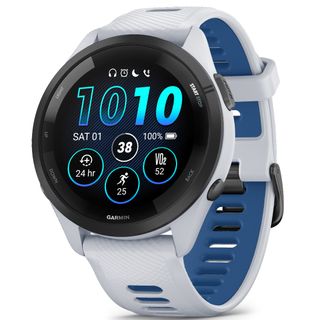
The most accurate GPS smartwatch
Aside from being our top pick for the best running watches, the Forerunner 265 supports both All-Systems GNSS and dual-frequency GPS. Our reviewer found its post-workout maps extremely accurate in areas where foliage and buildings thwart GPS-only watches. It lasts 16 hours in SatIQ mode, which switches to dual-frequency when the signal gets weak but otherwise uses battery-saving GPS.
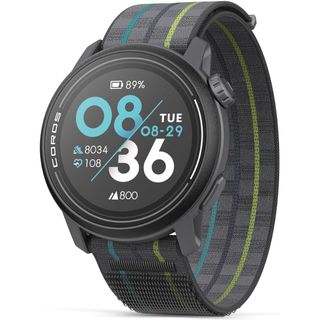
Most affordable dual-frequency
The COROS PACE 3 costs a mere $230, lasts a day longer than the Forerunner 965, and offers 15 hours of dual-frequency GPS or 25 hours of "all-systems" mode that actually uses five GNSSs at once (most watches only use two at a time). It's a fantastic deal, and while its accuracy fell slightly short of the Garmin Forerunner series in tests, it's still highly accurate compared to most other brands.
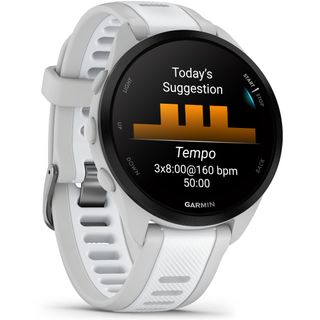
Best affordable accuracy
Even though the COROS PACE 3 wins on paper, the Garmin Forerunner 165 — which only offers 17 hours of all-systems GNSS mode and lacks some features like training load — beat the PACE 3 in a GPS accuracy test for both a standard run and a track run. It's not quite as accurate as the 265, but the Forerunner 165 costs $200 less and is accurate enough that everyday runners should be happy with the results.
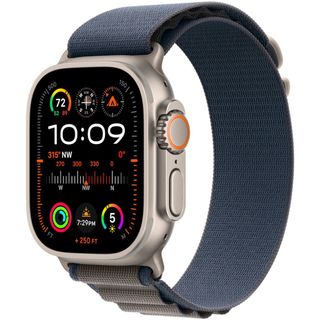
Hardcore fitness for iPhones
You'll rarely find dual-frequency GPS on a traditional smartwatch. The Apple Watch Ultra 2 is the exception, with 12 hours of dual-frequency tracking that's auto-corrected behind the scenes with Apple Maps data and a nationwide database of tracks; in our accuracy testing, it's done exceptionally well. You'll have to accept its limited 36-hour battery life, but the apps and ultra-bright squircle display make up for it.
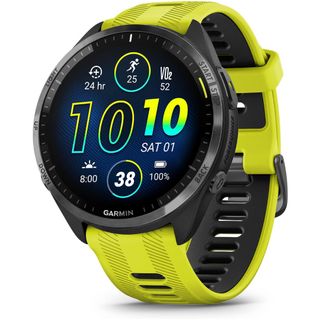
Same tech, better battery and maps
The Garmin Forerunner 965 has the same perks as the 265 for a slightly higher price, but lasts 19 hours in dual-frequency GPS mode and an extra 10 days in smartwatch mode. Unlike the Forerunner 265, it comes with predownloaded topographical maps, too, so you can go on a hike and look ahead to trailheads instead of having to predownload GPX files. Our Forerunner 965 vs. 265 guide runs through the other key differences.
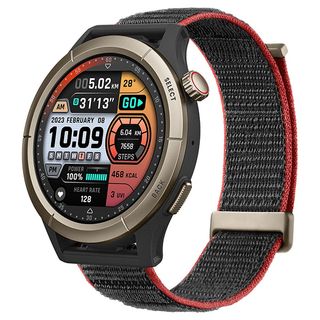
Dual-band + MaxTrack accuracy
The Cheetah Pro has a "circularly-polarized" satellite that Amazfit claims is "99.5% as accurate as a professional gold standard GPS locator." In practice, our Cheetah Pro reviewer noted "drifting and suspiciously angled lines" in his post-run maps but otherwise said it followed "fairly closely with [his] Forerunner 965 map." It's a fairly affordable Forerunner alternative if you need other smarts like a mic and speaker.
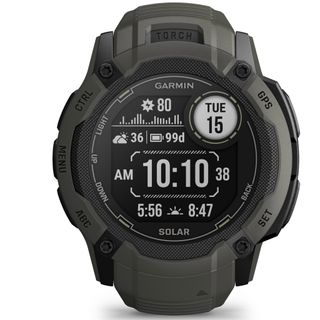
Best watch for GPS and battery life
Dual-frequency GPS demands a ton of power, so most AMOLED watches can't use it for very long before draining their batteries. The Garmin Instinct 2X Solar uses its massive battery, low-energy display, and solar panel to last 36 hours in multi-band mode. Outside of workouts, it can last an "unlimited" amount of time in low-energy modes if you spend enough time outside and don't use the built-in flashlight too much.
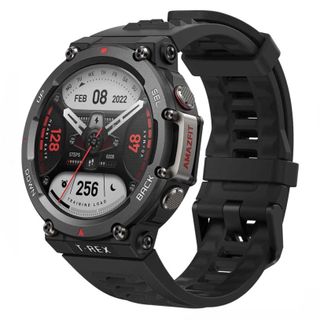
Rugged dual-band fitness
The Amazfit T-Rex 2 gives you dual-band and all-systems tracking in its GPS Accuracy mode, and at a much lower price point than most of the other GPS smartwatches on our list. We're big fans of its bright display, military-grade protection, and decent number of fitness sensors for health data. Even without MaxTrack, it's pretty darn accurate for GPS.
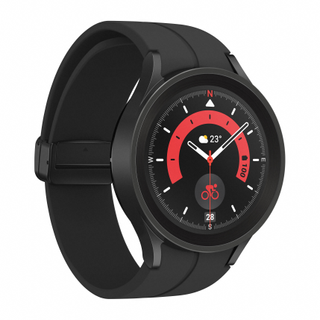
Your Android "pro" option
We've mostly emphasized fitness watches over traditional Android watches on this list. The Galaxy Watch 5 Pro only lets you use one GNSS like GPS at a time, but its 80-hour battery life is among the best ever for its type of watch, and it lets you download offline GPX maps if you don't have a signal for Google Maps.
Want a fitness tracker with built-in GPS? Try one of these!
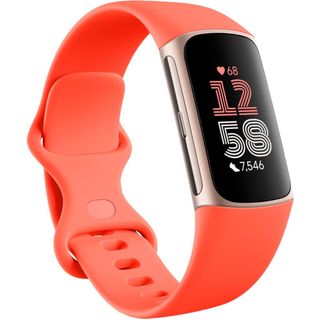
Our favorite fitness tracker
One of the rare fitness trackers with built-in GPS, the Fitbit Charge 6 is about as accurate as your typical GPS-only device, relying on your smartphone tracking data to correct it in "Dynamic GPS" mode. The lack of altimeter for elevation data and some reported antenna issues make it harder to recommend for running, but it does exceptionally well in other areas like heart rate data, and it's very affordable.
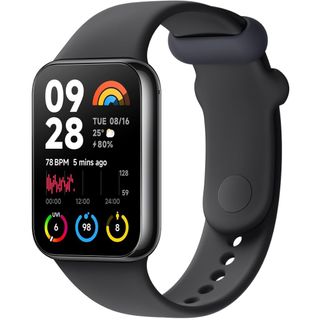
Basically a mini-smartwatch
We're including this on our list of fitness trackers with built-in GPS even though it's barely a tracker with a display this size. We've yet to review the new 8 Pro, but we did like the Smart Band 7 Pro for its wide AMOLED display and affordable price. The 8 Pro has running workouts, a vitality score, and other useful fitness data.
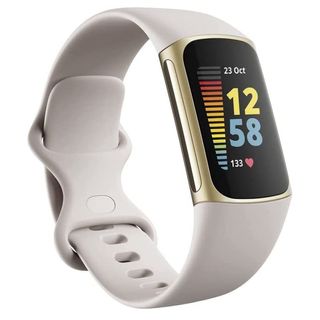
Last-gen favorite
The Fitbit Charge 5 isn't something we recommend buying anymore, now that the Charge 6 has supplanted it, but if you can find a refurbished one for cheap, it essentially has the same design and features as the newer model, including built-in GPS. Otherwise, the fact that we're including it here should clue you in to how rare built-in GPS is for petite fitness bands.
Deciding how much GPS accuracy you actually need
We've described all the different watches with All-Systems GNSS or dual-frequency/ multi-band GPS, but do you actually need those? Or is simple GPS data all you need? Well, it depends on where you typically work out.
All-Systems mode employs two or more satellite systems at once, but the benefit of this depends on how well alternative systems like GLONASS, GALILEO, BeiDou, or QDZZ actually perform in your area. Garmin says multiple GNSSs help with "increased performance in challenging environments and faster position acquisition than using GPS only," while COROS recommends it for these areas: "city near tall buildings, neighborhoods with significant tree canopies or mountainous/hilly terrain." Overall, this is a useful perk, but you're still liable to deal with reflecting location signals.
Dual-frequency mode offers the most accurate data you can get because it tracks you across L1 and L5 satellite data coming from multiple directions, so if one signal is blocked, you can still count on the other to pick up the slack. Garmin says this delivers "more consistent track logs, improved positioning, improved multi-path errors, and fewer atmospheric errors." COROS recommends it for "rock/ice climbing sheer rock faces in narrow canyons, hiking deep within forests, in between mountain peaks, or near sheer cliff drop-offs such as the Grand Canyon."
In other words, you may not need dual-frequency tracking outside of extreme conditions, but it's certainly nice to have, and it generally offers better tracking even if you live somewhere totally flat. On the other hand, this mode also consumes the most battery life, so you have to consider which GPS smartwatch will last long enough for your needs.
As for trackers, most of our favorite fitness trackers rely on connected GPS, meaning you need your phone nearby to track your workouts. Most phones have pretty accurate location data on par with what you'd get with a GPS-only smartwatch, so a fitness tracker or watch with built-in GPS lets you run without a phone but doesn't necessarily give you a huge accuracy boost. It's only with All-Systems or dual-frequency that you'll get the best possible performance, which means choosing a bulky fitness watch over a tracker.
Be an expert in 5 minutes
Get the latest news from Android Central, your trusted companion in the world of Android

Michael is Android Central's resident expert on fitness tech and wearables, with an enthusiast's love of VR tech on the side. After years freelancing for Techradar, Wareable, Windows Central, Digital Trends, and other sites on a variety of tech topics, AC has given him the chance to really dive into the topics he's passionate about. He's also a semi-reformed Apple-to-Android user who loves D&D, Star Wars, and Lord of the Rings.
For wearables, Michael has tested dozens of smartwatches from Garmin, Fitbit, Samsung, Apple, COROS, Polar, Amazfit, and other brands, and will always focus on recommending the best product over the best brand. He's also completed marathons like NYC, SF, Marine Corps, Big Sur, and California International — though he's still trying to break that 4-hour barrier.
